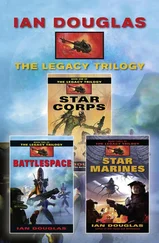“The head, shithead. Make it shine. And scrape that shit off your shell.”
He tossed her a jaunty mock salute. “Aye, aye, sergeant, sir, ma’am!”
Kaminski sighed. After seven months, he was getting to know the tiny lavatory facility in the enlisted barracks very well. Slidell was his fire-team partner, and Corps discipline held both men responsible for infractions that reflected on the fire team as a whole. Hell, Fulbert and Marchewka were probably giving silent thanks that the shit detail hadn’t hit the entire squad. Slidell had a peculiar talent for drawing fire.
“Ice it down, Slider,” Kaminski said. “We’re in enough trouble already.”
“Shee-it,” Slidell drawled as Caswell flexed her knees and launched herself across the compartment toward the hatchway. “What’re they gonna do, send us to fuckin’ Mars?”
Hang on a little longer, he told himself. Things’ll be better when you hit dirt. Space was short, and tempers frayed in a situation where, paradoxically, there were too many people for the available space and too much work for the available people. The current TO&E for a Marine weapons platoon called for five-man squads—a pair of two-man fire teams and a squad leader—organized two squads to the section, two sections to the platoon. Kaminski was in First Squad, First Section; Slider, Sergeant Marchewka, and Lance Corporal Ben Fulbert were his squadmates, while Sergeant Ellen Caswell was both First Squad leader and First Assistant Section leader. Gunny Knox also wore two hats, as First Section leader and as Lieutenant King’s assistant platoon leader.
With so small a force—a weapons platoon of twenty-three men and women, reinforced by a headquarters element of seven more—there was lots of double-hatting going on, and the Marines, rather than being mere passengers on the cycler transport, were expected to do their share of maintenance, cleaning, and general scutwork. The real problem, though, was the fact that the MMEF platoon was so damned top-heavy in the ranks. The lowest rank aboard was E-3—lance corporal—and there were lots of corporals and sergeants, more than was usual for a typical weapons platoon. And when shit flows downhill in the military, it lands on the low man on the pole.
Part of the deal, in fact, was that all personnel in the MMEF would keep their current ranks until the end of the mission, which was expected to last the better part of two years, a measure designed by some desk-flying bureaucrat Earthside to keep the platoon from getting even more top-heavy than it was already from sheer time-in-grade attrition. Where they were going, there were no replacement depots or work pools to replace the lucky SOB who made E-4. That wasn’t really as bad as it sounded. All of them were getting flight pay, hazardous-duty pay, and hardship pay enough to more than make up for the financial shortcomings of the arrangement. When they got back to Earth, most of the guys on their first hitch, Kaminski among them, would have their four in and have the choice of accepting a double promotion—Kaminski would have a shot at sergeant—or returning to civilian life with one hell of a nice separation pay packet.
Kaminski knew what he was gonna do. Four years for him was a great plenty. He would put in his hitch, and in another 745 days he would be out of here, out of the Corps and back to being a carefree civilian.
With lots of money waiting for him, too. Surreptitiously, he reached up beneath his breastplate, tugging at his BDU blouse to make sure the flag was still wrapped around his waist. Slidell saw the gesture and laughed. “Still there?”
Kaminski nodded. “Good thing, with all these damned PIs.”
“You just keep it there, Ski, out of sight. Ha! Man, we’re gonna clean up when we get back, right?”
“Aw, fer…” Kaminski shook his head. “Why don’t you tell everyone, Slider?”
“Tell us what?” Sergeant Witek, one of the HQ element people, asked.
“Nothin’,” Kaminski said, a little nervous. There wasn’t anything wrong with what he was doing. But the other guys probably wouldn’t understand….
As far back as the Mercury program in the early 1960s, astronauts had carried small and easily transported items with them into space—toy space capsules, coins, even stamped envelopes that could be postmarked in space…items that would be worth a hell of a lot to collectors upon their return. This was a joint venture. It had been Slidell’s idea to take something that might serve as a souvenir…and Kaminski’s idea that the souvenir should be a flag, an American flag. He wore it day and night wrapped around his waist beneath his T-shirt, because if Knox or one of the other senior NCOs found it in his gear locker during an inspection, he’d be cleaning that lavatory cube all the way back to Earth, and likely they’d confiscate the flag, which would be worse. The idea was to have everyone sign it after the mission was over; Slidell claimed he knew a guy in San Diego who could put an artifact like that up for auction. God, a flag signed by fifteen or twenty of the Marines who’d actually been to Mars ought to fetch thousands….
“All right, First Section!” Knox called out. “Hit the hatch!”
Making sure his M-29 ATAR assault rifle was securely strapped to his back, Kaminski joined the other Marines as they single-filed through the hatch and out to the transport pod. “Hey, Slider? What the hell do they want with US Marines on Mars, anyway?”
“Shit, why does the brass ever do anything?” Slidell replied. “To dump on the enlisted guy.”
Which seemed as good an answer to Kaminski as any he’d heard so far.
WEDNESDAY, 9 MAY: 1705 HOURS GMT
Carnegie Mellon University
Pittsburgh, Pennsylvania
1305 hours EDT
Kaitlin Garroway took the second-floor door out of Herb Simon Hall onto the elwalk and headed for Schenley Park. Two exams down, three to go, plus her final project, and then she was off to Japan. She needed to work some more on her project this afternoon, but first she needed to clear her mind. After being closed up all morning, she was eager for the sight of trees and grass and blue sky.
The weather was something she really liked about Pittsburgh, the variety of the seasons, the spectacular explosion of fall colors, the sharp joy of spring after an icy winter. The dull sameness of the weather at Camp Pendleton in Southern California, where her dad had been stationed before his junket to Mars and where she’d lived before she entered college three years ago, had sometimes made her ready to scream. She laughed. Yukio thought she was nuts, but then his part of Japan was a lot like Southern California. Small wonder he hated the winters here.
Resting her hand lightly on the railing, she ran down the steps from the elwalk to ground level and walked down the hill into the park. What exactly did she feel for Yukio? She’d liked him from the moment they’d met last fall, in the Japanese Room of the International Center, and for the past few months, they’d been spending more and more of their free time together. Kaitlin wasn’t scared of the words, “I love you,” and had certainly used them with Yukio, but did those words necessarily imply a lifetime commitment? Was she ready for a lifetime commitment?
Maybe she didn’t need to know. Maybe it was enough to know that she loved him, that she enjoyed being with him and talking with him about everything. Well, everything except politics, but then who does like to talk about politics? Her parents had never agreed on politics—that’s what her dad said, at any rate; her mother had died before Kaitlin was politically aware—and they got along beautifully. She and Yukio had just recently started talking about the possibility of a long-term relationship, and now with their upcoming trip to Japan, she found herself thinking about it a lot.
Читать дальше












